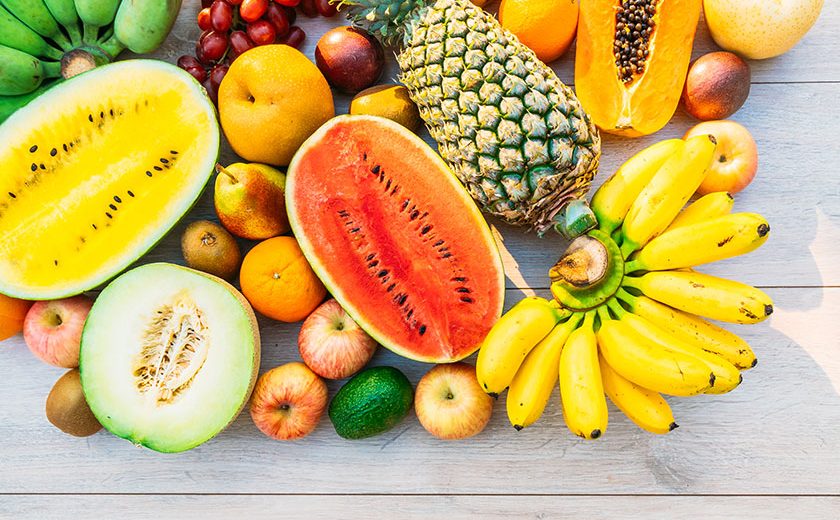If you love fruits, you are in for a treat as they are delicious and healthy at the same time. Here’s how to consume fruits the right way to get the most out of them.
Fruits offer many health benefits – they help to reduce blood cholesterol, lower the risk of heart diseases and ensure proper bowel function. For those who want to consume fewer calories, fruits give you a feeling of fullness because of their fibre content. They are also loaded vitamins – for example, mangos, apples and papayas are high in Vitamin A while guavas, strawberries and kiwis are power-packed with Vitamin C.
The recommended daily intake of fruits is about 2 servings daily. Also bear in mind that fresh fruits are better than canned or dried fruits. While canned or frozen fruits can be kept longer, you would need to watch out for their high sodium and sugar content. Pick the ones that are 100% natural and avoid those soaked in syrup or sugar solution. As for dried fruits, they are nutritionally inferior because there’s loss of vitamin C and folate during the drying process. The main drawback of dried fruit is that it usually contains more calories per serving than fresh fruit because most of its water – which gives fruit its bulk – has been removed.

What about fresh fruit juices? Juices are a good option for people who are picky eaters, as you can combine other fruits to make it tastier and more flavourful. While there are benefits to drinking fruit juice, it may not be as good as consuming a whole fruit. Another downside of drinking fruit juice is the sugar content which is absorbed in the body quickly due to the absence of fibre content, leading to blood sugar spikes.
You may not know this, but there’s also a right time and right way when it comes to taking fruits. Some people believe that eating fruits on an empty stomach provides greater health benefits. This myth has been popularized mainly through websites and email chains. The idea is that eating fruit with a meal slows down digestion, meaning that food sits in the stomach for a long time and can rot or ferment.
Contrary to this myth, even if fruit remained in the stomach for an unusual length of time, the fruit would not have the chance to rot due to the stomach’s ability to prevent bacterial overgrowth. Most microorganisms are incapable of growing within the acidity of the stomach. According to research, protein, fibre, and fat help the stomach slow the release of food into the small intestine. This way, the body absorbs smaller amounts of sugar at a time, which limits its effect on blood sugar levels.
Generally, it is good to eat nutritious, low-calorie fruit before a meal as it may make a person feel fuller and therefore make them less likely to overeat during or after their meal. Eating fruit alongside a meal can also help a person eat fewer high-calorie foods. Replacing high-calorie snacks with fruit — at any time during the day — is a great way to promote weight loss.
Portion Control
The best way to minimize fruit’s blood sugar effects is to avoid eating too much at one time.
Some folks also prefer to only eat fruits during breakfast. That is actually not advisable. Breakfast should be an ideal combination of carbs, proteins, fibre, fats, vitamins and minerals. Since your breakfast is meant to break your 7-8 hours of fasting after a good night’s sleep, the first meal of the day should be packed with nutrients to fuel your body for the rest of the day. If your body does not get the required amount of nutrition at the beginning of the day, this will eventually make you binge on heavier meals the rest of the day. In this sense, it is better to have fruits in combination with other healthy breakfast foods like wholemeal bread, tuna, eggs and milk or yogurt.
While fruits provide you with a whole load of vitamins and minerals, they should not replace vegetables under most circumstances. From a nutrition perspective, the biggest differences between them are sugar content and nutrient ratio. Usually fruits contain a higher level of sugar from 5% to 15%. Vegetables contain various nutrients like carotene, vitamin C, vitamin B family, potassium, magnesium and more, especially from those leafy green ones.
For people with diabetes, they should stay within the guidelines of fruit intake to avoid sudden blood sugar spikers. Current nutrition guidelines recommend that people with diabetes consume not more than 2–3 servings of fruit per day, which is the same as the general population. Fortunately, most fruits are high in fibre and polyphenols, which actually slows the digestion and absorption of sugar. That being said, not all fruits are created equal. Some of them raise blood sugar more than others – for instance high GI fruits like banana, grapes and watermelon. On the other hand, low GI fruits like apples, oranges and guava offer better control of blood sugar levels.
To get the most out of your fruits, aim for balance, moderation and variety in your fruit consumption. Always consume different types of fruits and vegetables. It’s easier than you think. All you need to do is let their colours guide you – you can create different combinations of nutrients by putting a ‘rainbow’ of colours on your plate.
Monitor Your Blood Sugar
Diabetics are encouraged to monitor their blood sugar levels after eating to figure out which foods they should limit.


